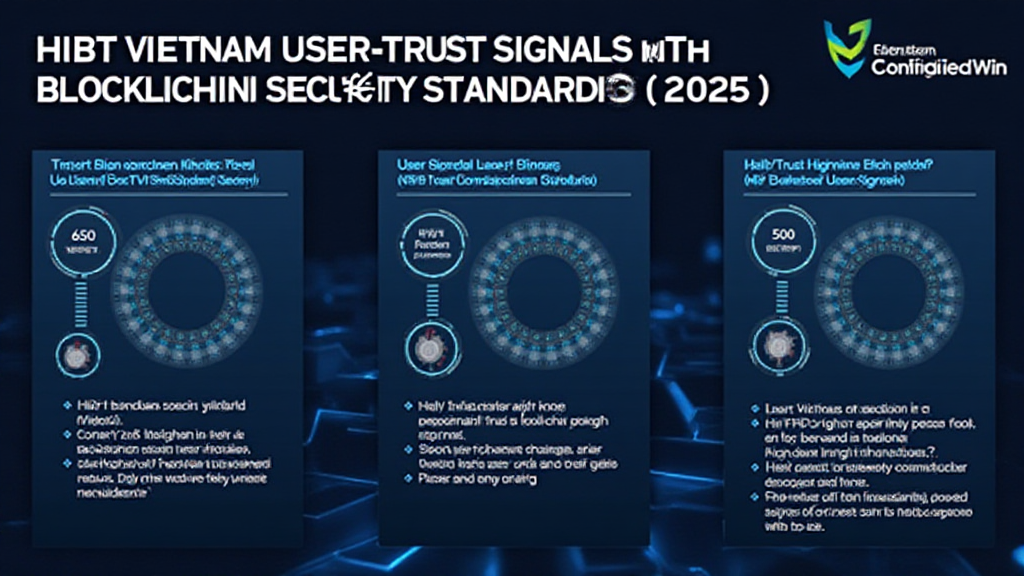Introduction
In the rapidly evolving world of cryptocurrency, ensuring user trust and platform security has never been more crucial. With $4.1 billion lost to DeFi hacks in 2024, the need for solid security standards is paramount. In Vietnam, the cryptocurrency market is experiencing exponential growth, with a user growth rate of 35% annually in 2023. This highlights the importance of establishing reliable security measures for digital assets. This article delves into the user trust signals specific to HIBT Vietnam and examines best practices for maintaining security in 2025.
Understanding HIBT Vietnam User-Trust Signals
User trust is critical for any cryptocurrency platform, especially in regions like Vietnam, where new entrants often face skepticism. HIBT (Hacker Identity Blockchain Trust) signals are essential indicators that can enhance user confidence in a platform. As a comprehensive framework, they consider various factors including:
- Transparency in operations
- Regulatory compliance
- Community engagement
- Security audits by reputable third parties
The integration of these elements allows platforms like ccoinshop to establish a robust user-trust baseline among its Vietnamese audience.

Blockchain Security: The Cornerstone of User Trust
Security is a non-negotiable aspect of blockchain technology. Just like a bank vault for physical assets, blockchain secures digital currencies through cryptography and decentralized networks. However, vulnerabilities, particularly in consensus mechanisms, can expose users to risks.
According to HIBT Vietnam, common vulnerabilities include:
- 51% attacks
- Smart contract bugs
- Insufficient cryptographic practices
These issues not only undermine the security of digital assets but also diminish user confidence. Therefore, platforms must adopt rigorous security protocols, including tiêu chuẩn an ninh blockchain, that prioritize user protection and compliance with local regulations.
Enhancing Trust with Regular Security Audits
One of the most effective ways to build and maintain user trust is through regular third-party security audits. These audits provide an independent review of the platform’s security measures, vulnerabilities, and compliance with industry standards.
For example, platforms undergoing audits similar to those recommended by HIBT Vietnam can address vulnerabilities proactively. Following recognized frameworks such as:
- OWASP Smart Contract Security Framework
- ISO/IEC 27001 for Information Security
By presenting audit results, ccoinshop increases its credibility, showcasing its commitment to security—a crucial trust signal not only in Vietnam but globally.
User Education: A Key Trust Signal
User education plays a critical role in enhancing trust. Educational resources such as webinars, blog posts, and instructional videos can demystify complex cryptocurrency concepts and security protocols.
For instance, discussing topics like how to audit smart contracts can empower users, making them feel more secure in their decisions. This approach also aligns with Vietnam’s growing interest in cryptocurrency, where educational initiatives can foster a more knowledgeable user base that values security.
Conclusion: A Secure Future in Vietnamese Cryptocurrency
As Vietnam’s user base within the cryptocurrency market continues to expand, platforms like ccoinshop must prioritize HIBT Vietnam user-trust signals to build robust security measures. By ensuring compliance with security standards, conducting regular audits, and enhancing user education, ccoinshop can establish itself as a trusted leader in the Vietnamese cryptocurrency landscape.
Let’s break it down: Security is a shared responsibility between platforms and users. With ongoing education and adherence to rigorous security protocols, the future of cryptocurrency in Vietnam appears promising.
As a final note, remember that this information is not financial advice. Consult local regulators or financial experts as needed. For further insights into cryptocurrency taxation in Vietnam, check our Vietnam crypto tax guide.
About the Author
John Smith is a blockchain security expert with over 15 published papers in the field. He has led audits for various well-known projects, contributing extensively to enhancing security standards in the cryptocurrency space.





